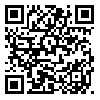Volume 9, Issue 4 (3-2018)
2018, 9(4): 49-55 |
Back to browse issues page
Download citation:
BibTeX | RIS | EndNote | Medlars | ProCite | Reference Manager | RefWorks
Send citation to:



BibTeX | RIS | EndNote | Medlars | ProCite | Reference Manager | RefWorks
Send citation to:
Fadaiyan Arani E, Amin Shokravi F, Tavakoli Ghouchani H. The Relationship between Health Literacy and Nutrition Behaviors in Patients with Type 2 Diabetes Mellitus. North Khorasan University of Medical Sciences 2018; 9 (4) :49-55
URL: http://journal.nkums.ac.ir/article-1-1313-en.html
URL: http://journal.nkums.ac.ir/article-1-1313-en.html
1- MSc Student, Department of Health Education, Faculty of Medical Sciences, Tarbiat Modarres University, Tehran, Iran
2- Associate Professor, Department Of Health Education, Faculty of Medical Sciences, Tarbiat Modarres University, Tehran, Iran ,aminsh_f@modares.Ac.ir
3- Assistant Professor, Department of Health Education and Promotion, Faculty of Health, North Khorasan University of Medical Sciences, Bojnurd, Iran
2- Associate Professor, Department Of Health Education, Faculty of Medical Sciences, Tarbiat Modarres University, Tehran, Iran ,
3- Assistant Professor, Department of Health Education and Promotion, Faculty of Health, North Khorasan University of Medical Sciences, Bojnurd, Iran
Abstract: (5301 Views)
Introduction: The level of health literacy is important to take care and treat patients with chronic diseases, such as diabetes. The current study aimed at determining the relationship between health literacy and nutrition behaviors in patients with type 2 diabetes mellitus in the 2 villages of Kaghazi and Husseinabad in Aran and Bidgol, Isfahan Province, Iran.
Methods: The current descriptive, analytic study was performed on 120 patients with type 2 diabetes in 2 rural health houses of Hosseinabad and Kaghazi villages in 2016. The census sampling method was used. Data were gathered using demographic questionnaire, nutrition behaviors, and HELIA (Health Literacy for Iranian Adults).The collected data were analyzed with SPSS version 17, using descriptive statistics (mean and standard deviation), t test, correlation coefficient, and analysis of variance (ANOVA).
Results: In the current study, 80 (66.7%) subjects were female; 29.2% were worker, 5.8% employee, 4.2% retired, 5% unemployed, and the rest were housewives. The mean age of the participants was 48.88 ± 9.57 years. In addition, the mean scores of nutrition behavior and health literacy of the participants were 17.38 ± 2.56, 114 ± 23.21, respectively. The findings of the current study indicated no significant relationship between health literacy and nutrition behaviors, although there was a significant relationship between health literacy and education (P < 0.02). Also, there was a significant difference in health literacy among males and females (P < 0.001).
Conclusions: Health literacy is desirable at the level of Iranian community, but due to the lower scores of nutrition behaviors, it is suggested to hold training sessions by health practitioners for patients with diabetes, especially rural females who play a major role in families in order to increase the level of health literacy and optimal nutrition behaviors.
Methods: The current descriptive, analytic study was performed on 120 patients with type 2 diabetes in 2 rural health houses of Hosseinabad and Kaghazi villages in 2016. The census sampling method was used. Data were gathered using demographic questionnaire, nutrition behaviors, and HELIA (Health Literacy for Iranian Adults).The collected data were analyzed with SPSS version 17, using descriptive statistics (mean and standard deviation), t test, correlation coefficient, and analysis of variance (ANOVA).
Results: In the current study, 80 (66.7%) subjects were female; 29.2% were worker, 5.8% employee, 4.2% retired, 5% unemployed, and the rest were housewives. The mean age of the participants was 48.88 ± 9.57 years. In addition, the mean scores of nutrition behavior and health literacy of the participants were 17.38 ± 2.56, 114 ± 23.21, respectively. The findings of the current study indicated no significant relationship between health literacy and nutrition behaviors, although there was a significant relationship between health literacy and education (P < 0.02). Also, there was a significant difference in health literacy among males and females (P < 0.001).
Conclusions: Health literacy is desirable at the level of Iranian community, but due to the lower scores of nutrition behaviors, it is suggested to hold training sessions by health practitioners for patients with diabetes, especially rural females who play a major role in families in order to increase the level of health literacy and optimal nutrition behaviors.
Type of Study: Orginal Research |
Subject:
Basic Sciences
Received: 2018/03/18 | Accepted: 2018/03/18 | Published: 2018/03/18
Received: 2018/03/18 | Accepted: 2018/03/18 | Published: 2018/03/18
Send email to the article author
| Rights and permissions | |
 |
This work is licensed under a Creative Commons Attribution-NonCommercial 4.0 International License. |





